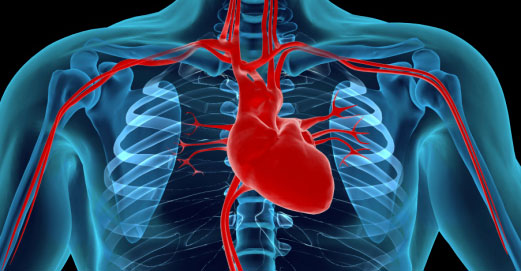


Stem Cell Treatment for Heart Conditions
Stem Cell Therapy Institute offers treatment for various heart conditions including congestive heart failure, non-ischemic congestive heart failure, recovery phase of ST-elevation after a heart attack and critical limb ischemia. Treatment is carried out with adipose-derived stem cells that are harvested from the patient's own fat cells.
Congestive Heart Failure Treatment with Stem Cell Therapy
Congestive heart failure is a condition in which the heart is unable to pump enough blood to the rest of the body. It is a long-term, chronic illness that usually affects both sides of the heart, although it is possible for just the right or left side to be affected.
As the heart is unable to pump oxygen rich blood around the body, blood can accumulate in various areas, causing a build-up of fluid in the arms, legs, lungs, liver, and gastrointestinal tract. Organs do not receive enough oxygen or nutrition and become damaged and poorly functioning.
The most common cause of congestive heart failure is coronary artery disease, a condition in which the small blood vessels that supply the heart with blood and oxygen become narrowed.
Congestive heart failure symptoms can come on quite gradually. The most common ones are a cough, shortness of breath, weight gain, swelling of feet, ankles and abdomen, palpitations, insomnia, rapid or irregular pulse, loss of appetite and fatigue.
ST-elevation MI treatment with Stem Cell Therapy
ST-elevation is a measurement on an electrocardiogram, in which the trace in the ST segment is very high above the isoelectric line. An electrocardiogram, or electrocardiograph, is an evaluation of the electrical activity of the heart over a period of time. It is captured and recorded by external skin electrodes.
The ST segment is related to a period of ventrical systolic depolarization, which means the cardiac muscle is contracted. Relaxation then subsequently occurs during diastolic repolarization. Normally the ST segment displays a particular order of muscular layers that repolarize at set times.
However, if the cardiac muscle becomes damaged or inflamed, its electrical properties transform. This can lead to premature repolarization, or the systole ending earlier than usual.
ST elevation can be present in several conditions including acute pericarditis, which is an acute inflammation of the sac surrounding the heart, left ventricular aneurysm, which is a complication that can occur after a heart attack and myocardial infarction (MI), another word for heart attack.
COPD Treatment with Stem Cell Therapy
COPD, or chronic obstructive pulmonary disease, is a very common lung disease. It causes difficulty in breathing and there are two main forms of it, chronic bronchitis, which is characterized by a long-term cough with mucus, and emphysema, which is the destruction of the lungs over a long period of time. The majority of COPD sufferers have a combination of these conditions.
The main cause of COPD is smoking. The longer someone smokes, the more likely they are to develop COPD. Nonsmokers can get emphysema if they lack the alpha-1 antitrypsin protein, but this is rare.
Risk factors for COPD also include the frequent use of cooking gas without proper ventilation, exposure to particular workplace fumes, pollution and secondhand smoke.
COPD symptoms include shortness of breath, a cough with mucus, recurring respiratory infections, fatigue and wheezing. As the symptoms of COPD develop quite slowly many people are unaware that they are in any way sick.
Non-Ischemic Congestive Heart Failure Treatment with Stem Cell Therapy
Non-ischemic congestive heart failure, or non-ischemic cardiomyopathy, is heart failure that is unrelated to coronary artery disease and therefore has nothing to do with a poor coronary artery blood supply.
This type of heart failure means there is a weakness in the heart that has been caused by something other than coronary artery disease. There are four different types of non-ischemic congestive heart failure: Dilated cardiomyopathy, hypertrophic cardiomyopathy, restrictive cardiomyopathy and arrhythmogenic right ventricular dysplasia (ARVD).
Dilated cardiomyopathy (DCM) is the most prevalent form of non-ischemic cardiomyopathy. This condition means the heart has a decreased ability to pump blood around the body because the left ventricle, its main pumping chamber, has become dilated, weak or enlarged. The heart chambers rectify this by stretching to carry more blood through the body. At first this works as the blood is kept moving with a strengthened contraction.
However, over time the heart muscle walls begin to weaken and suffered reduced pumping strength. In many cases the kidneys react to this and retain extra sodium and fluid. When there is a build-up of fluid in areas like the legs, ankles, feet or lungs the body is congested, causing congestive heart failure.
Non-ischemic congestive heart failure symptoms include shortness of breath, swollen legs and feet, fatigue, weight gain, a congested cough, palpitations, dizziness, fainting and blood clots.
In most cases the cause of non-ischemic congestive heart failure is unknown.
